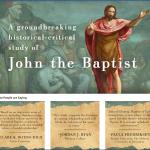Left Behind, pp. 395-397
After hearing Rayford Steele’s impassioned sales pitch for faith in “the Antichrist and all,” Buck Williams is rethinking his own beliefs. At the same time, Jerry Jenkins is busy rewriting the preceding 21 chapters of his book, letting us know, retroactively, about things he had neglected or even denied earlier.
Part of that rewriting process here involves a fuller picture of the substance of Rayford’s speech. Based on the rather sketchy accounts of that speech we’ve gotten so far, his key point was that the Trip and Die guys were a (disappointingly flameless) version of something predicted in Revelation, meaning the Antichrist would be here soon.
If one heard Rayford’s speech the way it has been thus far described, and if one believed him, then the reasonable response would be something like stockpiling food and water and heading for the hills. That is, in fact, exactly what Jesus says to do. In the “mini-apocalypse” in Matthew’s Gospel (Chapter 24), Jesus says:
When you see standing in the holy place “the abomination that causes desolation,” spoken of through the prophet Daniel — let the reader understand — then let those who are in Judea flee to the mountains. Let no one on the roof of his house go down to take anything out of the house. Let no one in the field go back to get his cloak. How dreadful it will be in those days for pregnant women and nursing mothers! Pray that your flight will not take place in winter or on the Sabbath. For then there will be great distress, unequaled from the beginning of the world until now — and never to be equaled again.
Many biblical scholars will tell you that the “abomination that causes desolation” is a reference to Antiochus Epiphanes’ desecration of the Temple and to the destruction of Jerusalem in 70 C.E., but that’s not important here.
What matters here is what Rayford, LaHaye and Jenkins believe this passage means. They believe this corresponds to the rise of the Antichrist as described in their End Times Checklist. The abominable Nicolae Carpathia may not yet be standing in the holy place — Rayford and his friends may still have a little time to go back for their cloaks — but he’s quickly slouching in that direction, so what are they still sitting around for? No one heeds or even seems to notice Jesus’ explicit, and very logical seeming, advice for those in what they believe is their precise situation: Run! Run for your lives! Fly, you fools!
These aren’t the sorts of things the authors want Buck to be contemplating as he paces through the night. They don’t want him worrying about famine, plagues, locusts, the seas turning to blood, the Mark of the Beast, or any of that. They want him to be worrying about the salvation of his soul.
From what we’ve seen so far, Rayford didn’t say much of anything to Buck about salvation or souls. No problem, Jenkins will just go back and insert it from here in the following chapter.
Thus we get the following Standard Christian Fiction Conversion Scene. These two paragraphs could have been (and maybe even were) lifted verbatim from any Christian Brand work of fiction available at your local Christian bookstore. All Jenkins did here was insert the names of his own characters:
Buck was on a personal quest now, looking to satisfy deep needs. For so many years he had rejected the idea of a personal God or that he had need of God — if there were one. The idea would take some getting used to. Captain Steele had talked about everyone being a sinner. Buck was not unrealistic about that. He knew his life would never stand up to the standards of a Sunday School teacher. But he had always hoped that if he faced God someday, his good would outweigh his bad and that relatively speaking, he was as good or better than the next guy. That would have to do.
Now, if Rayford Steele and all his Bible verses could be believed, it didn’t make any difference how good Buck was or where he stood in relation to anybody else. One archaic phrase had struck him and rolled around in his head. There is none righteous, no, not one. Well, he had never considered himself righteous. Could he go to the next level and admit his need for God, for forgiveness, for Christ?
This is the masculine version of the standard preconversion scene, hence the football-coach lingo there — “go to the next level.” The feminine version tends to read more like something from a romance novel with lots of talk of “finally yielding” and “surrendering” and “offering herself up” (to Christ, of course).
This boilerplate doesn’t fit here. It doesn’t fit with Buck’s character (to use that term generously) as we’ve seen it developed (to use that term extremely generously) over the previous 400 pages. Buck, as we’ve come to know him thus far, is a man whose self-concept is wholly out of proportion to his actual self. He’s a 30-year-old virgin who imagines himself a worldly wise rogue. He’s an unprincipled coward, willing to cut a deal with his friend’s murderers to save his own skin, yet he imagines himself a hero. And he’s a deadline-skipping, story-burying hack who imagines himself the subject of his peers’ jealous fantasies.
That gap between who he really is and who he imagines himself to be is not sustainable. At some point, maybe just out of the corner of his eye, Buck is going to catch a devastating glimpse of who and what he really is. That will be an epiphany he may not even survive. That realization really would give him the sweaty chills and set him pacing through the long, dark night. Compared to that, the abstract argument of “Rayford Steele and all his Bible verses” is weak tea. Rayford’s pitch, as described in this boilerplate insert, could never convince Buck to “admit his need” because Buck has never felt such a need. Need isn’t something you can be easily talked into.
The mention of Buck’s “personal quest … to satisfy deep needs” might hint at some previously unsuggested longing for meaning on his part, but I’m not buying that either. Buck’s pursuit of meaning and purpose, such as it is, has taken the form of his work, his vocation as a reporter. In Buck’s case, to paraphrase G.K. Chesterton, that source of meaning has not been tried and found wanting, it has been found difficult and left untried. It’s too soon for Buck to give up on his notion that being a great reporter might give his life meaning because he’s barely even trying to be a great reporter.
It may be that Buck is heading down a dead end street, but he is making so little progress doing so that he shouldn’t yet realize that he’s going to have to turn around. Buck isn’t all that different from the vast majority of those who suspect that, platitudes to the contrary, money might buy them happiness. Most such people will never have enough money to credibly test that theory. Until they do, they will never think, “Ah, I should look elsewhere for meaning,” but only, “How can I get more money than I have now?” A counterfeit dream, half-heartedly pursued, is indistinguishable from a real one.
Nor does this awkwardly inserted Standard Conversion Scene fit, at all, with what we have been previously told of the actual contents of Rayford’s speech. I’ve previously mentioned Rayford’s strange confusion of evangelism and “prophecy.” His idea of evangelizing, up until now, has been portrayed as offering an outline of the End Times Checklist while insisting, without ever demonstrating, that it has all been foretold in the Bible. He’s never mentioned Jesus, sin, salvation, God’s love, forgiveness or redemption.
That approach, as we discussed earlier, is completely unrecognizable to most evangelicals who tend to think of evangelism as presenting the gospel through some formal construct like the Four Spiritual Laws, the Romans Road, the Wordless Book or the Bridge Illustration. Rayford’s “evangelism” hasn’t followed any such standard approach. He hasn’t even made use of the requisite Hypothetical Bus even though, if he were right about the checklist, he could point to a fast-approaching Rider on a Pale Horse and note that the current best-case scenario involves his listeners meeting their maker in less than seven years.
But now, suddenly, we’re told that Rayford did, in fact, work some kind of more traditional gospel message into his speech about the checklist and “the Antichrist and all,” including quoting Romans 3:10, “There is none righteous, no, not one.”*
I am trying to imagine how this could work. “Jesus loves you, your sins are forgiven” is not easily combined with Wormwood falling from the sky and locusts given the power of scorpions to torture men and the plagues of fire, smoke and sulfur from the mouths of horses with heads like lions. “So you see, Buck, God loves you and has a wonderful plan for your life. Well, not for your life. Your life, the six years and 11 months that’s left of it, will consist of suffering divine wrath in the form of seven seals, seven trumpets, seven plagues and seven bowls, each worse than the last. Let me describe those for you in detail …”
The only way I can imagine fusing those two messages into one would be to promise Buck that he will experience Hell on earth and Heaven when he dies (soon, and violently). That’s a connection through disconnection. It’s a message so heavenly minded that it’s no earthly good.
As Jenkins continues to revise and extend Rayford’s earlier remarks, we learn that he also somehow worked good old Chapter 3 of the Gospel of John into his Antichrist speech:
Was it possible? Could he [Buck] be on the cusp of becoming a born-again Christian? He had been almost relieved when Rayford Steele had used that term. Buck had read and even written about “those kinds” of people, but even at his level of worldly wisdom he had never quite understood the phrase. He had always considered the “born-again” label akin to “ultraright-winger” or “fundamentalist.” Now, if he chose to take a step he had never dreamed of taking, if he could not somehow talk himself out of this truth he could no longer intellectually ignore, he would also take upon himself a task: educating the world on what that confusing little term really meant.
Note again the contrast between intellect and intellectual honesty — the two are constantly presented as opposites in Left Behind.
I’m not sure why Buck “had never quite understood” the meaning of “born again” or why he finds the term “confusing.” Born. That word we know. Again. That one, too. Born again. Not terribly complicated. As the other John said, it would be just like starting over. The idea of starting over, a second chance, a clean slate — that’s not at all confusing.
What is confusing in the paragraph quoted above is what Buck takes this to mean now that, he suggests, he finally really understands the phrase. That confusion isn’t specifically the authors’ fault. It’s part of a larger confusion in American evangelicalism that we’ve discussed before as the pyramid marketing scheme of the contentless gospel: “The good news is that now you can tell others the good news.” (Yes, but what is that news? “To tell others the news.” But this news you’re going to be telling them, what is it? “That they can tell others the good news, too.” Yes, but …)
Buck nearly grasps something even more confusing. The hyphenated compound adjective “born-again” has become a label for attitudes and connotations that seem wholly incompatible with the simpler, more obvious implications of the term. Here’s a group of people that chooses to self-identify with a phrase that announces that they have themselves needed a second chance. They are proclaiming that they are the second-chancers, the do-overs, the mulligan-takers, the fuss-ups and muck-ups who have had to return to Square One. We’d expect that such a group would be marked by a generosity of spirit toward others that reflected the generosity they have, themselves, benefitted from. Yet instead we find, as Buck says, a group of “ultraright-wingers” whose foremost defining characteristic for those both within and without the group — according to the born-againers at the Barna Research Group — is “excessive contempt and unloving attitudes.”
Buck says he intends to start “educating the world on what that confusing little term really meant.” I wish by that he meant that he wanted to start correcting this contradiction of being the unforgiving forgiven. But, of course, what Buck really means is that he’s decided the ultraright-wingers are right and so therefore he intends to become just like them.
That contradiction — the contrast between what it ought to mean to refer to oneself as a second-chancer and what it actually seems to mean in our culture — somehow reminds me of this:
The kingdom of God is like a king who decided to square accounts with his servants. As he got under way, one servant was brought before him who had run up a debt of $100,000. He couldn’t pay up, so the king ordered the man, along with his wife, children, and goods, to be auctioned off at the slave market.
The poor wretch threw himself at the king’s feet and begged, “Give me a chance and I’ll pay it all back.” Touched by his plea, the king let him off, erasing the debt.
The servant was no sooner out of the room when he came upon one of his fellow servants who owed him $10. He seized him by the throat and demanded, “Pay up. Now!”
The poor wretch threw himself down and begged, “Give me a chance and I’ll pay it all back.” But he wouldn’t do it. He had him arrested and put in jail until the debt was paid. When the other servants saw this going on, they were outraged and brought a detailed report to the king.
The king summoned the man and said, “You evil servant! I forgave your entire debt when you begged me for mercy. Shouldn’t you be compelled to be merciful to your fellow servant who asked for mercy?” The king was furious and put the screws to the man until he paid back his entire debt.
That parable illustrates part of why I find Buck’s soul-searching so unconvincing. As impressed as he claims to be with “There is none righteous, no not one,” he still sees himself more as somebody owing $10 than as somebody owing $100,000.
That’s also related to why the connotations of “born-again” are so different than what the phrase would seem to suggest on its own. The label brings to mind people who are convinced that they owe God $10, but that everybody else owes him a lot more. Those others, they seem to think, really deserve debtor’s prison, or Hell, or Tribulation. Those others deserve to be Left Behind.
– – – – – – – – – – – –
* St. Paul himself was quoting the 14th Psalm, so evangelists have to be particularly careful when citing this passage. If they were to open their Bibles to Psalms rather than to Romans, they might accidentally convert someone to Judaism instead of Christianity.
















